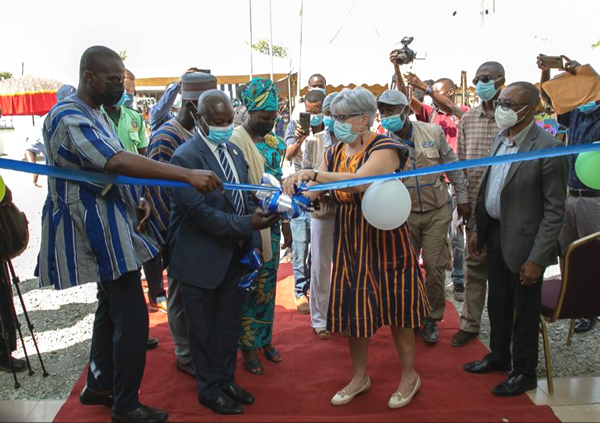
The United States is committing $45.5 million over the next five years to improve water, sanitation, and hygiene (WASH) services in Ghana. U.S. Ambassador Stephanie S. Sullivan joined representatives of the Ministry of Sanitation and Water Resources to launch the project in Tamale today.
The U.S. Government, through USAID, will work together with the Government of Ghana (GOG) to enhance governance and planning for WASH projects, strengthen sustainable financing, improve private sector engagement, and accelerate the adoption of healthy hygiene practices. The project will focus on six regions in northern Ghana: Upper East, Upper West, North-East, Northern, Savannah, and Oti Regions.
Ambassador Sullivan reiterated the United States’ commitment to supporting Ghana to achieve UN Sustainable Development Goal Six to Ensure availability and sustainable management of water and sanitation for all by 2030. “Communities need clean water and healthy sanitation.
Together we will continue to support individuals, communities, districts, and regions to achieve universal access to clean water and basic sanitation and hygiene services. This is an essential action during the COVID-19 pandemic, and beyond, to improve the health of Ghanaians and their economy.”
This new initiative aims to provide 300,000 people with access to basic sanitation services and provide 250,000 people with access to basic drinking water services.
Over the next five years, USAID and partners will work with the Minister of Sanitation and Water Resources, District Assemblies, environmental health officers, community leaders, and the private sector to strengthen the governance financing of WASH services.
This new effort will ultimately empower citizens to adopt sustainable, long-term WASH behavior change to improve their health and economic opportunities.
The project builds on over a decade of partnership between the U.S. Government and the Government of Ghana on water, sanitation, and hygiene and overall healthcare delivery systems.
Over the past five years, through the WASH for Health project, 150,000 people gained access to basic drinking water services and 200,000 gained access to improved sanitation facilities.
WASH for Health built and rehabilitated 200 water boreholes, providing an essential source of water to hospitals, clinics, and schools.
In addition, five, small-town water systems are providing clean water to 50,000 people. Also through WASH for Health, a ground-breaking partnership with the private sector led to the development of the Digni-loo, a more durable latrine which is 80% cheaper than similar latrines. The model is now being used in countries around the globe.
While in Tamale, in collaboration with Gushiegu District, Ambassador Stephanie S. Sullivan attended the launch of Ghana’s first ever decentralized ambulance dispatch center.
Ambassador Sullivan was joined by the Chief Executive of the National Ambulance Service, Professor Ahmed Nuhu Zacharia; and Robert Waaja Dawuni, Municipal Chief Executive, Gushiegu, to commission Ghana’s first district Emergency Dispatch Center (EDC), in Gushiegu, Northern Region.
The Emergency Dispatch Center is a key component of a $5.1 million U.S.-supported health system strengthening project- Developing Acute Care and Emergency Referral System (ACERS), which also raises awareness amongst community members to seek emergency services, and supports health workers to improve service delivery.
The project has a specific focus on mothers and newborns, addressing bottlenecks in accessing safe and quality healthcare services at the time of most need.
Source: US Embassy, Ghana























